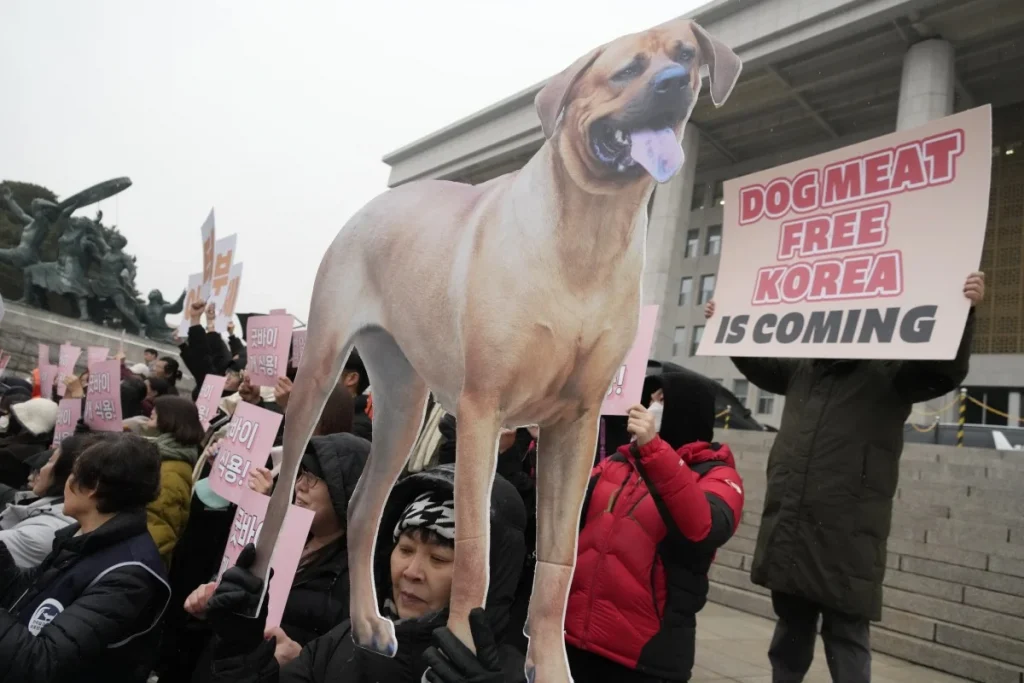- The passing of a bill banning the breeding, slaughter and sale of dogs for meat is a big achievement given heavy industry opposition
- This success should inspire China to examine its own tolerance of dog meat sales as a similar ban could improve the country’s soft power and help safeguard law and order
On January 9, South Korea’s National Assembly adopted a special bill outlawing the breeding, slaughter and sale of dogs for human consumption. The vote was historic.It started a three-year grace period for South Korea’s dog farmers, slaughter operators and dog meat restaurant owners to transition to alternative livelihoods with government compensation and assistance. When the law takes effect in 2027, acts that violate it could result in a jail term of up to three years and a fine of 30 million won (US$23,000).
The adoption of the bill was no small accomplishment. By the end of 2023, some 1,150 farms had raised 2 million “meat dogs”, supplying the country’s 1,600 restaurants. For decades, domestic and international voices have persistently called for the trade to be outlawed. The country’s dog meat traders have faced and survived waves of domestic and international pressure that started with the 1988 Seoul Summer Olympic Games.

While the renewed pressure during the 2018 Pyeongchang Winter Olympics seemed to be the last straw, Korea’s dog meat traders stood defiant. For decades, international criticism was rejected as Western cultural bias against Korean tradition. Helping the trader’s “cultural tradition” claim was the uncertain legal status of dogs and dog meat.In 2023, when multiple bills against the dog meat trade were introduced, the traders organised what turned out to be their last-ditch effort to turn back the tide of history. They staged a protest before the presidential palace and threatened to set free all the “meat dogs”.
The January 9 vote will have an effect beyond South Korea. It might not, in the immediate future, trigger a similar act in North Korea, but the move will certainly send shock waves across Southeast Asia where dog meat sales remain buoyant in several countries. As the world’s largest dog meat market, mainland China has come to a crossroads and should take a serious look at its dog meat sales.China has long been criticised for its dog meat trade, particularly the staging of the Yulin Dog Meat Festival, a commercial event created by Yulin’s dog meat dealers.
Zhao Wanping, a deputy to the National People’s Congress, last year submitted the most recent of many similar proposals for outlawing the trade. Zhao’s proposal went viral in a TikTok video. To undermine the criticism, traders and their supporters have resorted to claims such as “dog meat is a traditional food”, “eating dog meat is a human right” and “Western criticism has ulterior motives”.
In at least two provinces, dogs are included on the list of livestock that can be legally slaughtered for food. The inclusion of dogs under these provincial slaughter regulations is likely to be based on these claims.
But such claims are as absurd as those of their South Korean counterparts. Dog meat is not a household food in China. A 2016 survey by Beijing’s Capital Animal Welfare Association and Humane Society International found that 72 per cent of Yulin residents did not regularly eat dog meat while only 12 per cent ate it weekly.
The dog meat trade is not common business in China. The country does not have dog farms. A significant portion of the dogs that are slaughtered are stolen, an act of unlawful deprivation of other people’s property. The trans-provincial shipment of sick and dying dogs, meanwhile, violates laws governing live transport and animal disease control and prevention.
The killing of dogs, which often occurs in public places, is shocking and cruel for all who witness it. Dog meat that is untraceable and lacks the required vaccination records is a threat to public health. Outlawing the dog meat trade will thus help to safeguard the country’s law and order.
Banning the dog meat trade would have other benefits, too. It could help increase China’s soft power as, to many people around the world, dogs are – like pandas – supposed to be loved and protected. Ending the trade would also remove another barrier between the mainland and the dog-meat-free societies in Taiwan and Hong Kong. More importantly, ending the trade would encourage the rise of a more compassionate, harmonious society. It is time for China to take action.

